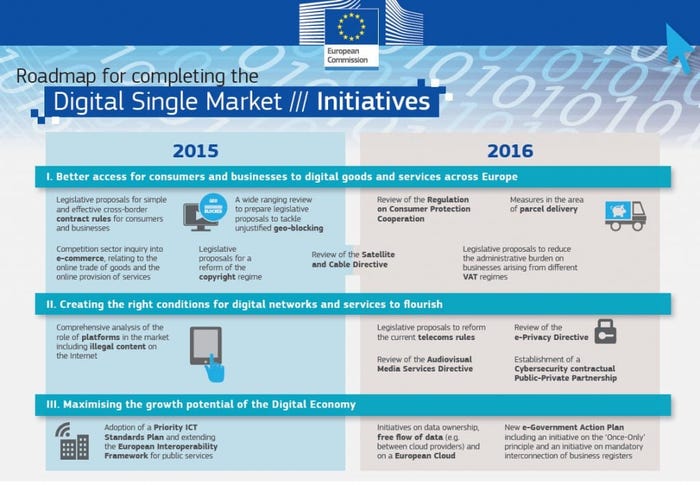Europe announces plans to interfere with OTTs and spectrum auctionsEurope announces plans to interfere with OTTs and spectrum auctions
The European Commission has unveiled its long awaited Digital Single Market (DSM) initiative, which has the stated intention of making the continent more competitive in the digital age.
May 6, 2015

The European Commission has unveiled its long awaited Digital Single Market (DSM) initiative, which has the stated intention of making the continent more competitive in the digital age.
As with most EC initiatives the underlying motivation is political; to further reduce the obstacles to inter-country collaboration and create a greater sense of the United States of Europe. In this case the focus is on the digital economy and lowering the barriers to cross-border trade.
The EC has developed no less than 16 separate initiatives to bring this digital utopia about, ranging from cheaper parcel delivery to harmonising VAT to a “European Cloud”. For good measure they’ve even organised the 16 commandments into three “pillars” that are summarised in the graphic at the top of this report.
For telcos, two initiatives stand out. The first is the much heralded antitrust inquiry into the e-commerce sector. It will look into potential barriers to cross-border trade created by companies and while it doesn’t explicitly identify them, this is generally understood to mean the giant US OTT players such as Google, Facebook and Amazon. This will happen in parallel with an analysis of online platforms that appears to be along the lines of its antitrust investigation into Google.
“European citizens face too many barriers to accessing goods and services online across borders,” said Margrethe Vestager, European Commissioner of competition policy. “Some of these barriers are put in place by companies themselves. With this sector inquiry my aim is to determine how widespread these barriers are and what effects they have on competition and consumers. If they are anti-competitive we will not hesitate to take enforcement action under EU antitrust rules.”
The second concerns the harmonising of European networks, including EU-wide criteria for spectrum assignment, with the apparent aim of creating a pan-European mobile network.
“Today, we lay the groundwork for Europe’s digital future,” said Commission President Jean-Claude Juncker. “I want to see pan-continental telecoms networks, digital services that cross borders and a wave of innovative European start-ups. I want to see every consumer getting the best deals and every business accessing the widest market – wherever they are in Europe. Exactly a year ago, I promised to make a fully Digital Single Market one of my top priorities. Today, we are making good on that promise.”
Junker is clearly happy to have taken just a year to put his words into action and is keen to maintain this frantic pace, with a vow to deliver on today’s pledges by the end of 2016, but not everyone shares his zeal.
Bengt Nordstrom, CEO of telecoms consultancy Northstream thinks the EC might be overstepping its mark. “I’m sceptical about regulating players like WhatsApp, Skype etc,” he told Telecoms.com. “The very idea that these companies must be regulated because they compete with operators is a step against innovation. The truth is that operators have not been innovative enough or fast enough, and in a competitive market that’s their loss. Increasing regulation on OTTs will damage the innovative climate that is very much needed in mobile industry.
As for meddling in national spectrum auctions, Nordstrom is looking for greater clarity. “The statement from the Commission is unclear what form they would like spectrum auctions to take,” he said. “If they are still looking to introduce regional spectrum auctions, that will not make much of a difference to what exists today and will not increase scalability. Many operators are already active in several countries, but that has not increased scale.
“If the goal is to build a strong European market, we need to take a closer look at roaming charges, which would make a greater impact and increase user-friendliness. Without roaming charges Europe has pan-European networks already.”
Another perspective was provided by the GSMA, which represents mobile operators, and is unsurprisingly looking for public money to be given to its members.
“The €155 billion of investment by mobile network operators in the seven years through 2014 has made a material difference to Europe’s economy and society,” said Afke Schaart, VP of GSMA Europe. “However, if we are to achieve the €340 billion additional GDP per year that the Commission estimates would be delivered by a full Digital Single Market, we need a step change in digital network investment. To encourage and support that investment, the regulatory framework needs to be modernised as a matter of urgency.
“The Vice President has prioritised key areas and we now call on him to do the same for the digital networks that will underpin the DSM Strategy by making an equally clear and unambiguous statement about investment and recognising the urgency of regulatory change by bringing forward the start of the telecom framework review.”
The EC could probably provide the most assistance to a digital single market by reducing red tape and harmonizing prices where possible, but that’s not how such organisations work. Mega-bureaucracies have to meddle to justify their existence, but tend to do so at a glacial pace. Telcos and OTT players now have a clear sight of what the EC plans to push through (as summarised in the ‘roadmap’ below) and have a year or so to adapt to it.

About the Author
You May Also Like










.png?width=300&auto=webp&quality=80&disable=upscale)


_1.jpg?width=300&auto=webp&quality=80&disable=upscale)